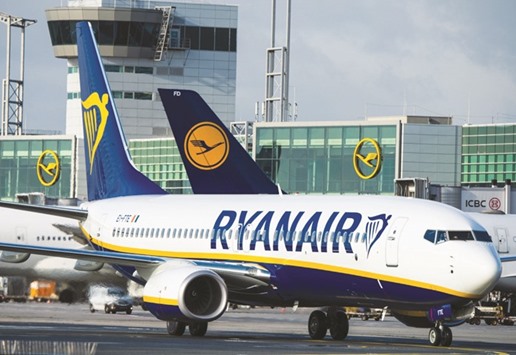Ryanair announced plans to move into Lufthansa’s home hub of Frankfurt, stepping up its push into bigger airports and ratcheting up pressure on the German carrier which is expanding its own budget flights.
Lufthansa said earlier yesterday it would offer fewer seats than planned this quarter as it seeks to offset pressure on ticket prices, following on the heels of British Airways owner IAG.
European airlines are grappling with falling fares as carriers, especially low cost ones, put more seats onto the market to try to take advantage of low fuel prices and gain market share.
Lufthansa has been driving growth at its Eurowings budget brand to compete, signing deals with Air Berlin and taking over part-owned Brussels Airlines.
That will make it Europe’s third largest point-to-point carrier next summer, behind Ryanair and easyJet.
Ryanair, meanwhile, has been expanding in Germany, where it wants to grow its market share to 20% from 8%, and is expanding at primary airports across Europe in a drive for more passengers and to attract business travellers.
The Irish carrier said it will start flying from Frankfurt airport, Germany’s largest, from next summer to four tourist destinations in Spain and Portugal, with plans for strong growth in winter 2017/18.
Frankfurt airport, operated by Fraport, has few low cost carriers due to its high fees and long turnaround times.
Lufthansa has around a 60% market share at Frankfurt.
Historically it has also had close relations with Fraport, in which it owns an 8% stake, but Fraport now plans to offer incentives and adjust the way passengers move through the airport to meet the demands of low-cost carriers.
“It’s already an affront just to hold a joint Ryanair and Fraport press conference on the same day as the Lufthansa third-quarter results,” fund manager Michael Gierse at Lufthansa investor Union Investment, said.
Lufthansa CEO Carsten Spohr said he expected the airline could save up to €300mn ($332.5mn) a year if it were to be offered the same conditions as Ryanair and also said it could start Eurowings flights from Frankfurt.
“That shows Lufthansa won’t take the Ryanair move lying down,” one Frankfurt-based trader said.
Lufthansa is struggling to bring down costs, with strikes at its budget units last week and a deal with its pilots on pay and pensions still outstanding.
Independent aviation consultant John Strickland said Ryanair’s arrival in Frankfurt would have little direct impact on Lufthansa’s network but could help the German carrier underline to unions and staff the need to cut costs on short-haul services.
“At its current cost levels it would not be possible for Eurowings to compete profitably on a head to head basis with Ryanair should that scenario arise,” Strickland said.
Ryanair currently flies to Frankfurt-Hahn airport, which is around 120km (75 miles) from the city — prompting mockery from Lufthansa on Twitter yesterday: “Welcome to the real Frankfurt airport, dear Ryanair. In case you get lost on such a big airport, just give us a call!”
Germany’s biggest airline now expects capacity growth of 8.7% in the fourth quarter, taking a further 1 percentage point off previous plans.
That takes its total growth for 2016 to 5.2%, from a previous 5.4%.
Ryanair can afford to add more seats to the market than its older rivals because of its low cost base and business model, whereby it fills planes irrespective of ticket price to minimise passenger costs and boost spending on extras.
“Anyone can produce a low fare, producing a low fare with a margin is the trick,” Ryanair’s chief commercial officer David O’Brien said at a conference last week.
Lufthansa said capacity growth next year will be 3% for its network airlines and 20% at Eurowings, for a total of 4 to 5%. Spohr said he expected the decline in unit revenues to slow next year, confirming a forecast for a drop of 7-8% in the fourth quarter. Lufthansa’s shares were down 0.3%, slightly outperforming German blue chips after it also signalled restraint on spending.

A Ryanair plane stands in front of a Lufthansa aircraft in Frankfurt am Main, western Germany. Ryanair said it will start flying from Frankfurt airport from next summer to four tourist destinations in Spain and Portugal, sparking outrage among German competitors.
